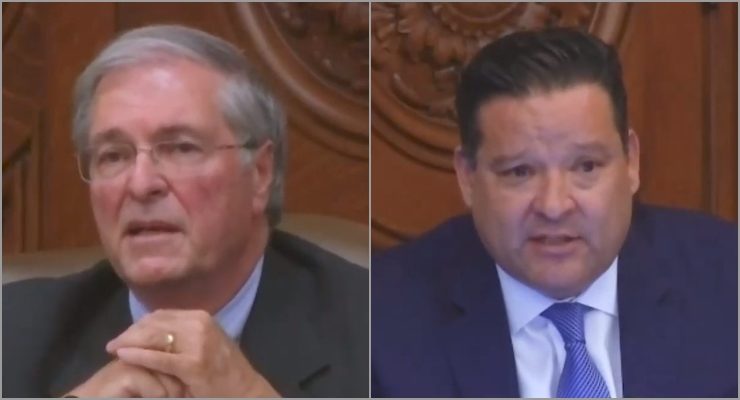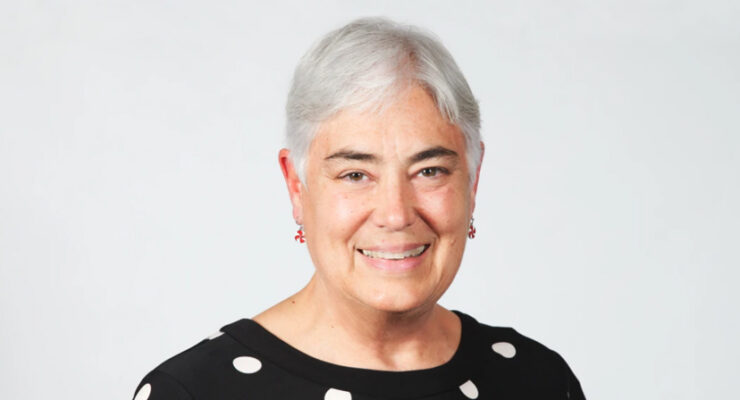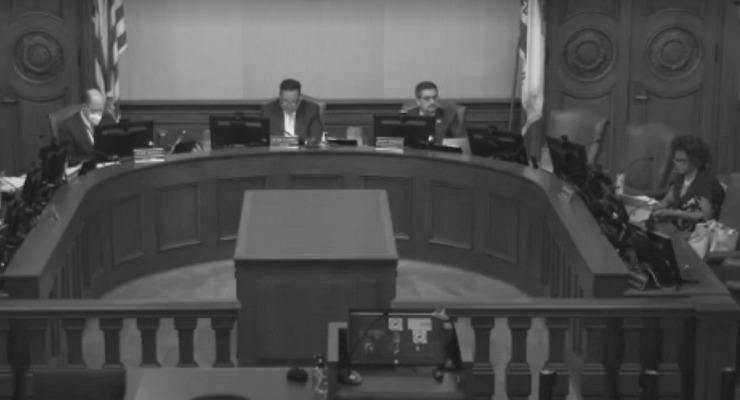
[UPDATED] Sitting alone in City Council Chambers with a moderator and video cameras, mayoral runoff candidates Mayor Terry Tornek and Councilmember Victor Gordo Thursday participated in the first of a number of planned debates.
Moderated by Dorothy Keane of the League of Women Voters Pasadena Area, the debate saw some differences between the two men, primarily in the styles of Tornek and Gordo, but they agreed on a number of issues.
While Tornek was more reserved in his responses and demeanor, Gordo was quick to challenge the mayor, particularly on an ordinance that allows for the creation of a civilian police oversight committee.
The City Council is scheduled to conduct the first meeting of the ordinance at Monday’s meeting. Last week, the Public Safety Committee discussed how members of that body will be chosen and vetted.
Gordo questioned the creation of the ordinance, which was drafted by Tornek and Councilmember John Kennedy, alluding to the idea that the ordinance was drafted without transparency.
“It concerns me,” said Gordo, “when I hear the mayor of this city say that (police oversight) is an issue that’s ‘fraught,’ and therefore two members of the City Council, and two members alone, deserve to run off and develop a policy outside of the public eye. Where did these meetings occur?”
Gordo continued, “I think Pasadena has a long history of working together as a council, as colleagues, and of including the public’s input, especially on issues of trust and oversight… Especially when there’s going to be different views and opinions, and especially on the most sensitive and important issue in any municipality, public safety. And so I reject that and on the issue of transparency and trust, half of our public safety committee is excluded.”
But Tornek responded, “The civilian oversight concept that was adopted unanimously by the City Council a couple of weeks ago and will be before us in ordinance form, I hope, on Monday, is really the result of careful listening to what the people had to say.
“Councilmember Kennedy and I generated a version of a proposal for discussion purposes,” Tornek continued. “We were roundly criticized for taking the initiative to move in such an expedient way. We felt that this was an issue that was so important to so many people and was so fraught for people in our city.”
Tornek said he felt that the issue was “so emotionally fraught and touched so many nerves, that it was not one that would abide the sort of typical meeting, meeting, meeting strategy.
“And so,” he continued, “we had the audacity to actually draft a proposal that was based on work that had been done and brought to the city council unsuccessfully four years ago.”
Following Friday’s debate, Tornek said, “I don’t know why Councilmember Gordo is making an issue out of the process. We should be proud of the process, not embarrassed. You can’t always conduct business as usual and the city, frankly, has behaved that way with regard to its reaction to the pandemic.
“It’s not business as usual,” said Tornek. “It’s business as unusual. And that’s because when you’re confronted with emergency conditions, you can’t just plot along in the manner that you would under normal circumstances.”
That emergency was sparked by the officer-involved death of George Floyd in Minnesota last May, an incident which prompted marches and protests across the country, including Pasadena, and forced businesses and cities to address systemic racism.
In an interview Friday, Gordo responded, “I believe that striking that balance, and finding that point where there’s transparency that then builds trust, but at the same time, supporting a Police Department that is effective at keeping Pasadena safe, (that) means every member of the Public Safety Committee working together.”
On the question of Ballot Measure J, which would divert 10 percent of the county’s budget to fund mental health and other services to be provided by other agencies rather than the police, Gordo was measured in his response.
“I don’t support budgeting by legislation. I support working together to debate matters to ensure that everyone’s voice is heard,” Gordo said. “I believe that we can do a better job with the resources we have in every department in human services.”
Gordo said that two years ago, he had asked to review city operations “department by department” and determine how the city was using resources, including the Police Department.
“I raised that law probably a year and a half, or two years ago,” he said. “We did get through two departments, but that was it. We didn’t schedule those meetings.
“And so here we are continuing to have the discussion about the effective and efficient use of resources,” Gordo continued. “We shouldn’t limit it to one department. We should look at all departments, but I cannot support doing it by legislation with a broad sweep because that’s not thoughtful. It’s not inclusive of everyone’s voice.”
Tornek was equally circumspect, saying that the idea of “defunding” the Police Department was “a misapplied term,” adding that “even the advocates have now kind of described that as reimagining the Police Department, rather than defunding it.”
Tornek went on to explain that following a Finance Committee review of department expenditures earlier this year, “People were a little bit surprised when they saw the totality of expenditures of all city funds, not just the general fund, in terms of how those dollars are allocated.”
Saying that the “discussion is evolving very thoroughly and carefully,” Tornek added that he didn’t think that “a straight percentage allocation…is a good way to do budgeting.”
Said Tornek, “I think it’s a dangerous way to proceed. I think the idea of just sort of arbitrarily saying we’re going to allocate these dollars in a fixed way has led to serious budgetary problems for other entities, both at the state level and the county level before.”
Tornek and Gordo also disagreed on the city’s membership in the San Gabriel Council of Governments (COG), one of more than a dozen similar organizations in Southern California. Gordo felt that Pasadena should be a “good neighbor,” while Tornek said he felt that the COG no longer served Pasadena’s interests.
Although Gordo won the primary election in March, both candidates were confident of victory in the Nov. 3 election. However, almost immediately after the March primary things began to change. First, with the pandemic and then the social justice issues, including the recent death of Anthony McClain who was shot by a Pasadena police officer.
Said Tornek Friday, “I’m convinced the outcome will change. We have a very different set of circumstances than we had in March. The world has turned, people had an opportunity to gauge our respective performances. I think that will benefit my campaign. There were two other people in the race before who are no longer there. Both of them have endorsed me.”
Tornek added, “This voter pool will be 50 percent larger than the one was in March. And I think people will be much better informed. So I think it’s a whole different ball game.”
Said Gordo of the debate and the upcoming election, “Mayor Tornek and I answered the questions. We just happened to see things differently on very important issues. The handling of COVID, representation of the people of the city. Our roles as elected officials, including that of the mayor, representing everybody in Pasadena, we just have a different approach. We have a different style and a different view, and I believe that it’s come through in this campaign.”














 1 comment
1 comment


